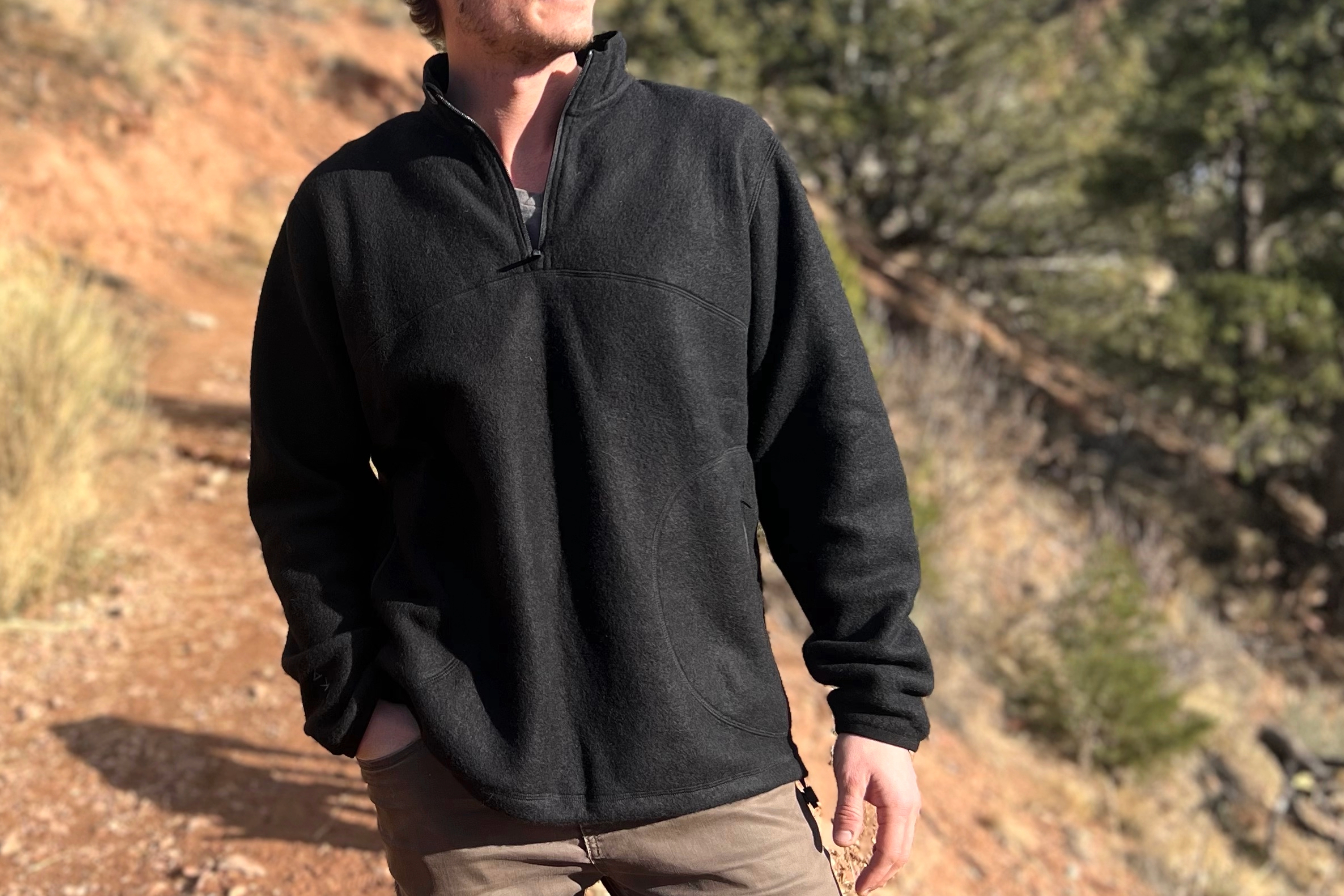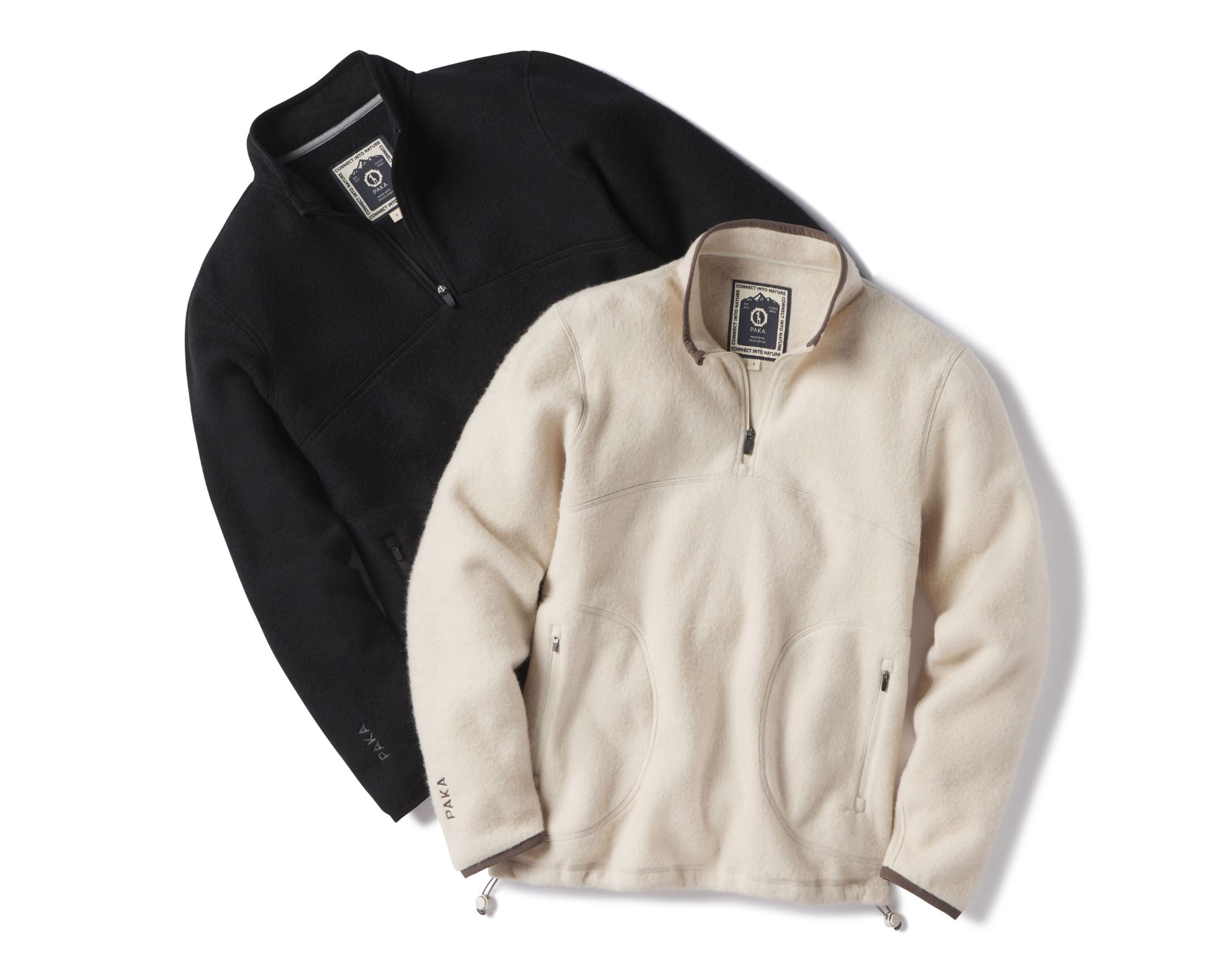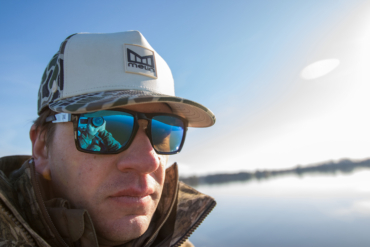The PAKACLOUD alpaca-fiber fleece pullover arrived on a cold Thursday afternoon and I immediately put it on. I’d been eager to test the new alpaca-based fleece that’s allegedly twice as warm as standard synthetic fleece.
It couldn’t have arrived at a better time. Temperatures in my part of Colorado had been hovering just below 30 degrees. The season was ripe for some fleece testing.
Naturally based materials like PAKA’s PAKACLOUD are having a moment right now. As brands and consumers become more sustainably minded, the outdoor industry’s demand for alternatives to petroleum-based fabrics is growing. Some brands are experimenting with cotton-based weather-resistant textiles. Others are using bamboo or merino wool.
I try to temper my expectations around these materials, though. While many natural alternatives perform well, they also have their downsides. Naturally based materials tend to be heavier than their synthetic counterparts. And they often aren’t as soft or as comfortable.
I quickly realized that wasn’t the case with the PAKACLOUD alpaca-fleece fiber alternative, though. It competes with petroleum-based fleece in all three of those categories. By Sunday evening — three full days after the fleece arrived — I was still wearing it. It’s a perfect pullover for dog walks, cold-weather hikes, après food and drinks, and the general day-to-day.
In short: PAKACLOUD is an impressive alpaca-based alternative to synthetic fleece. It boasts twice the thermal efficiency, has a softness that rivals cashmere, and is three times lighter than sheep’s wool. And like wool, the fiber is naturally odor-resistant. Plus, PAKA uses fiber that is fully traceable to its natural origins in the Andes Mountains of Peru.
To see how the PAKACLOUD compares to other top-tier midlayers on the market, check out GearJunkie’s Best Midlayers Buyer’s Guide.
- Weight: 410 g (0.9 lbs.) – men's medium
- Materials: 42% traceable alpaca; 30% recycled polyester; 14% merino wool; 14% recycled nylon
- Sizes: XS-XXL
Pros
- Lightweight
- Twice as warm as conventional fleece
- Made from naturally based materials
Cons
- Little to no wind resistance
PAKACLOUD Alpaca-Fiber Polar Fleece Review
When you’re wearing your favorite polar- or microfleece, you’re wearing a petroleum product. Yes, it’s vegan. But because it’s essentially plastic, it also won’t degrade in a landfill.
Boulder, Colorado-based PAKA spent 4 years developing its alpaca-based fleece fiber, a sustainable alternative to petroleum-based fleece. It’s the latest in a string of materials innovations from the brand, aimed at making outdoor apparel healthier for the planet. In 2022, PAKA announced PAKAFILL, its warm, ethically sourced alpaca insulation alternative.
The PAKAFILL jacket landed in our Best Down Jackets for Women 2023-24 roundup. Now, with PAKACLOUD, the brand has taken the same approach and applied it to fleece.
The Science of PAKACLOUD
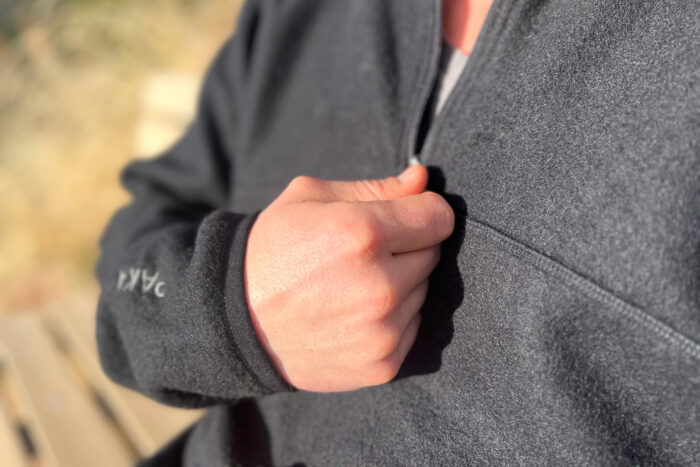
The fabric itself is a blend. It’s 35% baby alpaca wool, 29% recycled polyester, 18% merino wool, and 18% recycled nylon. So it’s not entirely made from natural materials. However, since PAKACLOUD’s nylon and polyester are recycled, at least it isn’t contributing new material to the waste equation.
PAKA had its alpaca fiber fleece tested by the IDFL Laboratory and Institute. It found that PAKACLOUD’s CLO value, which measures the thermal efficiency of a material, was twice that of standard petroleum-based fleece.
PAKACLOUD is also wicked soft. For some more science insight, a fabric’s softness is measured in “microns” that denote how fine the fiber is. Cashmere is 19 microns — PAKACLOUD is 18-19 microns.
On top of all that, PAKA claims that PAKACLOUD is extremely durable as well. Because of its brushed construction, there are no yarns that can snag and get pulled out.
Design & Features
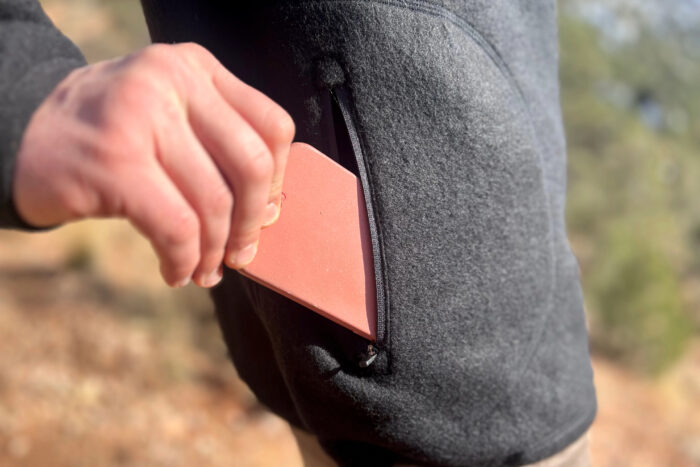
The garment PAKA made with its new PAKACLOUD material is a solid fleece pullover. It’s a classy-looking number with two zippered pockets, flatline stitching, an adjustable hem, and a front quarter-zipper. I would say you could wear this out to a nice dinner date without drawing a second glance. But you could also wear it on the trail and you’d feel right at home.
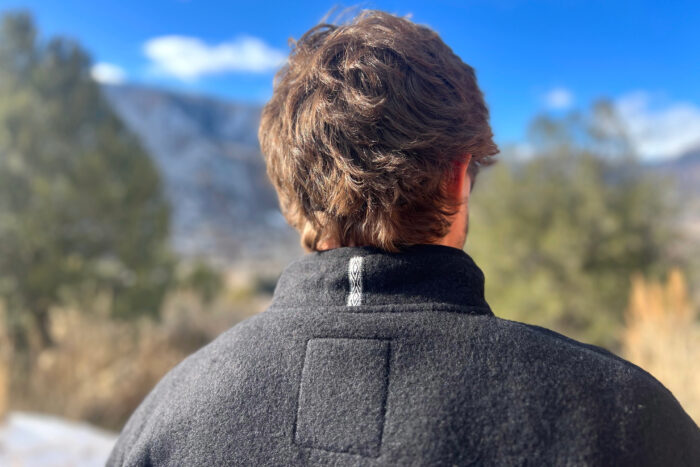
One of my personal favorite features of the PAKACLOUD fleece pullover is the handwoven “Inca ID” on the back of the collar. PAKA employs local female Incan artisans in Peru — at four times the average living wage.
They hand-make every one of these culturally stylized IDs, which adds a tasteful flash of Peruvian panache.
In the Field

I wore my PAKACLOUD fleece on early morning dog walks, hikes about my local trails, out for beers and dinner, and just generally around town when I was feeling chilled. I’ve got a lot of fleece apparel in my closet. And I’ve found myself pulling this one out more and more frequently.
I like the way it looks, and I like the way it feels. That’s a recipe for a sweater that will get a lot of use. And so far that’s proven to be the case with my PAKACLOUD.
So, So Soft
I cannot understate how soft this material is. As my editor phrased it, it’s “Remarkably soft — buttery soft. So soft, you will ask people to touch it.”
This might be the most striking aspect of PAKACLOUD. If the brand wove blankets out of this stuff, I’d buy one.
Most of the time, I wore this fleece with long-sleeve baselayers underneath. But there were plenty of days when I just wore a T-shirt and it was a delight to do so.
PAKACLOUD is not only wearable next to the skin — it feels great against the skin. As mentioned, unlike most wool clothing or other wool-based fabrics, the PAKACLOUD fleece isn’t itchy. It’s softer and at least as comfortable as any conventional fleece I own.
I’ve even been tempted to wear it around shirtless altogether. And, thanks to the natural odor resistance that wool fibers offer, I wouldn’t stink the fleece up if I chose to do so.
Lightweight
At just 410 g, I never hesitated to bring it along for a hike. On a couple of occasions, I worked up a decent sweat in the PAKACLOUD hiking my dog up a trail behind my house. But because of alpaca fiber’s strong natural moisture-wicking capabilities, I never seemed to soak it through. And I haven’t noticed any residual stink.
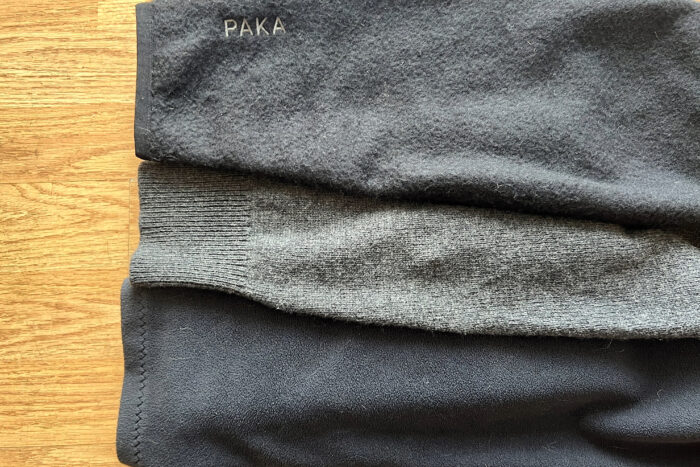
Warmth
Anecdotally, compared to microfleece garments, I found the PAKACLOUD pullover notably warmer. The brand attributes that to natural air pockets in the wool that reduce heat transfer and contribute to this fleece’s insane warmth-to-weight ratio.
Compared to more substantial polar fleece products I own, it feels roughly on par — unless there is a breeze. PAKACLOUD does not offer much wind resistance. On a blustery day, I wouldn’t opt for this particular top, unless that is, you paired it with an outer layer that offers wind resistance.
Worn as a midlayer under a shell, I don’t balk at walking around in 20- to 30-degree weather, windy or not. Worn under a puffy, this fleece has kept me comfortable on mornings with 10- to 25-degree temps.
What’s It For?
Overall, the PAKACLOUD fleece worked well for active pursuits. But I found myself wearing it out to dinner, around town, and hanging with friends more than I did during exercise.
It’s honestly too warm for most high-output athletic activities. It’s thicker and warmer than I prefer my active midlayers to be. But as a casual hike and lifestyle piece? This is one of my new go-to fleeces.
Drawbacks?
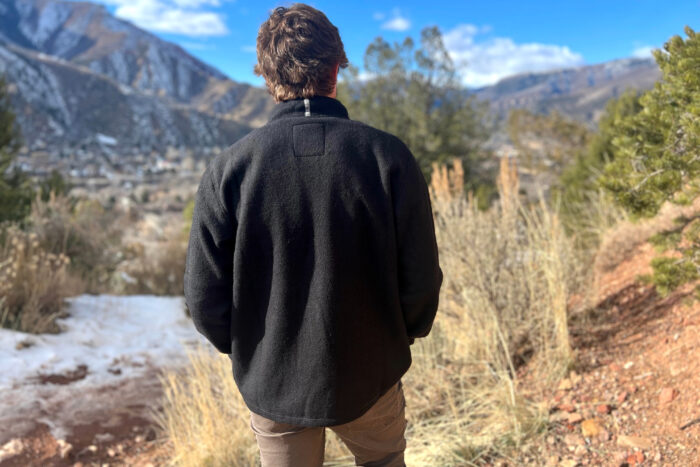
There isn’t much to critique here, in my opinion. The design of the pullover is very basic, and it looks good. The PAKACLOUD material itself is light, soft, and warm. I’d put this at the front of the pack of naturally based alternative fleeces.
But my editor did point out that the natural stretch of PAKACLOUD makes it awkward to store heavy items like phones, wallets, and keychains in them. I’ve noticed this as well, and honestly, I think the pullover would work just as well without pockets altogether. Although, they are nice for smaller things like glasses, chapstick, lighters, etc.
I haven’t had to wash my PAKACLOUD yet (it still hasn’t started to stink). So I can’t attest to how well this fleece will hold up to washing, wear, and long-term use. It’s so light and soft I’ll be amazed if it proves to be resilient over time, doesn’t pill, and retains its loft.
When asked about washing, PAKA told GearJunkie that the best way to ensure the longevity of PAKACLOUD is to wash it only with cold water and to air dry it flat.
There’s also part of me that wishes the weave was tighter to create more wind resistance. And it would be great if PAKA made a version with a hood.
But I also realize this is the very first iteration of PAKACLOUD and the first product made with it. Those developments could be coming down the pike in seasons and years to come.
The Final Word
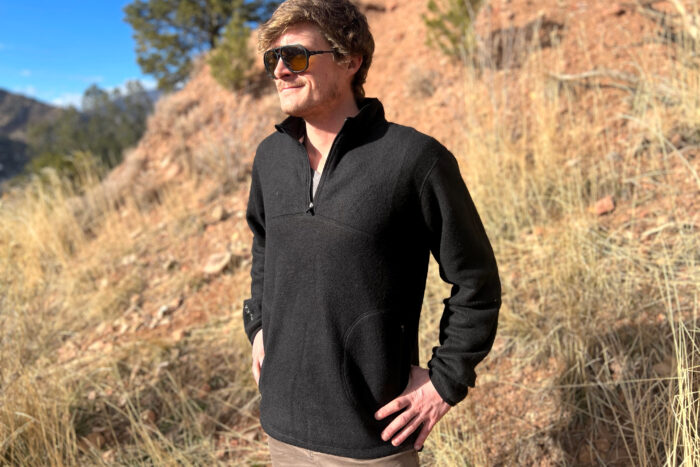
Conventional petroleum-based fleece was an incredible material. It changed apparel and outdoor gear after its creation in 1979. It’s even spurred fantastic advances in technical outerwear that keep folks both comfortable and safe in the outdoors. But it’s also a product that sheds contamination into the water every time it’s washed and virtually never breaks down even after its useful life.
PAKACLOUD isn’t a panacea material to solve that problem. But it’s a development in naturally based fleece fiber that is promising. It’s as soft as cashmere, warmer as synthetic fleece, traceable back to the alpacas it came from, and it isn’t prohibitively expensive. At $165, it’s comparable to most of GearJunkie’s Best Wool Sweaters of 2023-24.
Sure, I’d recommend the PAKACLOUD pullover to any consumer who wants to reduce their environmental footprint. I’d also recommend it generally to anyone who needs (or wants) a nice fleece.
Sustainability aside, this pullover is as high quality as any fleece pullover you’ll buy from big brands like The North Face or Patagonia. Its traceable alpaca makeup is just an organic cherry on top.
